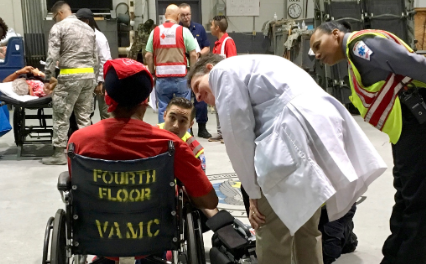About the HHS emPOWER Program
Why the HHS emPOWER Program is Needed
Advances in technology and health care service delivery have better enabled at-risk individuals with access and functional needs to live independently in their personal homes. Millions of at-risk individuals, particularly older adults and those who are chronically ill, rely upon essential health care services and or electricity-dependent durable medical and assistive equipment and devices (DME), to do so. Local incidents, such as prolonged power outages, to large-scale public health emergencies, such as a pandemic, and disasters can disrupt access to health care and rapidly thrust these at-risk individuals into life-threatening situations within hours or days. Many may rapidly seek assistance from emergency medical services (EMS), and or overwhelm hospitals and shelters when seeking access to care or secure power. Others may shelter in place, as they are unable to evacuate safely without assistance, putting their lives at risk. This leads to severe surges in healthcare demand and stress on public health, health care, emergency management, and first responder systems and shelters, and commonly leads to increases in adverse health outcomes for at-risk individuals impacted by the event.
Public health officials, emergency managers, first responders and health care providers commonly reported that they did not have access to timely information that could help them better address the needs of at-risk populations in their communities. To help, ASPR, partnered with the Centers for Medicare and Medicaid Services (CMS), to conduct a novel, first-in-the-nation emergency preparedness exercise pilot to assess whether Medicare Program administrative insurance claims data could help public health authorities protect the health of community-based at-risk populations, enhance emergency planning and response activities to support continuity of care and potentially reduce adverse outcomes and system surge in the event of an incident, emergency, or disaster. The exercise demonstrated that Medicare claims data could provide valuable information to help protect health and save lives prior to, during and after an incident, emergency or disaster.
What the HHS emPOWER Program Offers
In 2013, ASPR expanded its partnership with the Centers for Medicare and Medicaid Services (CMS) and launched the HHS emPOWER Program (emPOWER) to harness the power of Medicare Program claims data to protect health and save lives across the nation. The program initially included at-risk population data for those who relied on life-maintaining and assistive electricity-dependent DME and later expanded in 2014 to include chronically ill at-risk populations who relied on a certain essential health care service(s), such as dialysis, as disaster-induced care disruptions led to surges in adverse health outcomes and stress on local EMS and hospitals. Since its inception, the program has continued to expand its at-risk population data and tools, training, and resources to help states, territories, and localities improve continuity of care and health outcomes for millions of at-risk individuals prior to, during, and after an incident, emergency, or disaster. In 2023, the HHS emPOWER Program made available the at-risk combinations data. This data provides monthly updated total counts for Medicare beneficiaries who rely on a certain essential health care service(s) and one or more electricity-dependent DME and devices, down to the ZIP Code level, for the HHS emPOWER Map, HHS emPOWER REST Service, and the HHS emPOWER Emergency Planning Dataset. Currently, the HHS emPOWER Program data covers over 4.6 million Medicare beneficiaries, of which over 3 million have a claim for electricity-dependent DME, and/or over 2.8 million have a claim for at least one of four health care services, that include outpatient facility-based dialysis, home oxygen tank services, home health care services, and home hospice care services.
The program provides data-driven tools that are readily meaningful, consumable, and actionable to support federal-to-community partners who have a broad array of roles or may volunteer to support emergency preparedness, response, recovery, and mitigation activities in their communities. Through continued partner engagement, the program has continue to deliver a diverse set of publicly available and restricted tools to provide the right data, in the right tool, to the right person, at the right time.
Building on these successes, the HHS emPOWER Program, in 2018, launched the novel and voluntary “emPOWERing State/Territorial Medicaid and Children's Health Insurance Program (CHIP) Data Pilot” to advance states' and territories' understanding of pediatric and other adult at-risk populations in their communities. The pilot provides knowledge, tools, and technical assistance to help states and territories create complementary emPOWER datasets using data from their own state or territory-operated Medicaid and CHIP data systems. States and territories may then use these datasets, along with emPOWER Medicare data, to identify, plan for and address the access and functional needs of at-risk pediatric, adult, and older adult populations in their communities.
How the HHS emPOWER Program is Making an Impact
Partners ranging from public health authorities, also known as public health or health departments, to first responders and community organizations access and use emPOWER's publicly available tools, which include the HHS emPOWER Map, REST Service, and emPOWER AI. With these tools, partners can access readily available de-identified data on the number of electricity-dependent at-risk Medicare beneficiaries in a geographic area to inform and support whole community emergency preparedness, response, recovery, and mitigation activities. State and territorial public health authorities use and share the HHS emPOWER Emergency Planning Dataset, as appropriate, to gain insight from more granular de-identified data on the number of electricity- and certain health care service-dependent Medicare beneficiaries in a geographic location to conduct targeted public health activities across the emergency management cycle. In the event of an incident, emergency, or disaster, an authorized state or territorial public health authority may submit an official request for the restricted and secure HHS emPOWER Emergency Response Outreach Dataset to conduct life-saving assistance and response outreach public health activities.
Learn more about the HHS emPOWER Program's history and accomplishments by accessing the materials in the Resources box on this page.

